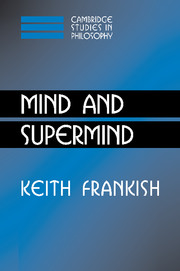Book contents
3 - Challenges and precedents
Published online by Cambridge University Press: 22 September 2009
Summary
The previous chapter set out some reasons for adopting a two-strand theory of mind and sketched the outlines of such a theory. This chapter goes on to look at some problems facing the proposed theory and at some precedents for it in the philosophical literature, including proposals by Ronald de Sousa, Daniel Dennett, and Jonathan Cohen. Throughout, I shall be searching for hints as to how to flesh out the theory – in particular as to how strand 2 beliefs are constituted and how they are related to strand 1 beliefs – and towards the end I shall pool these hints and suggest what shape a developed two-strand theory should take.
CHALLENGES
At the end of the last chapter I outlined some general problems facing a two-strand theory. I now want to introduce some further problems, related to specific features of the proposed theory.
The Bayesian challenge
I have claimed that we possess a kind of belief which is ‘flat-out’ – which is unqualified and does not come in degrees. (It is worth stressing that it is the attitude which is unqualified in flat-out belief, not necessarily the content. It is possible for a flat-out belief to have a qualified content – for example, that there is a 75 per cent chance of rain tomorrow.) The claim that we possess flat-out beliefs is not a particularly radical one – indeed, many philosophers of mind write as if flat-out belief is the only kind we have.
Information
- Type
- Chapter
- Information
- Mind and Supermind , pp. 52 - 89Publisher: Cambridge University PressPrint publication year: 2004
